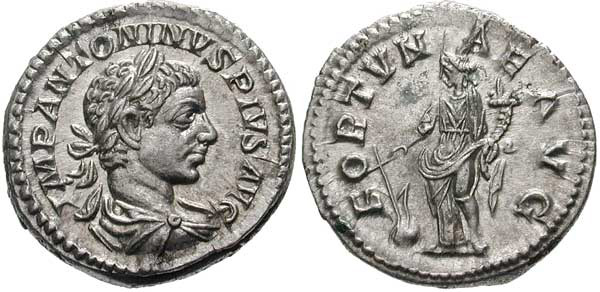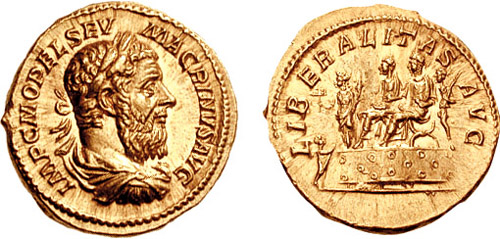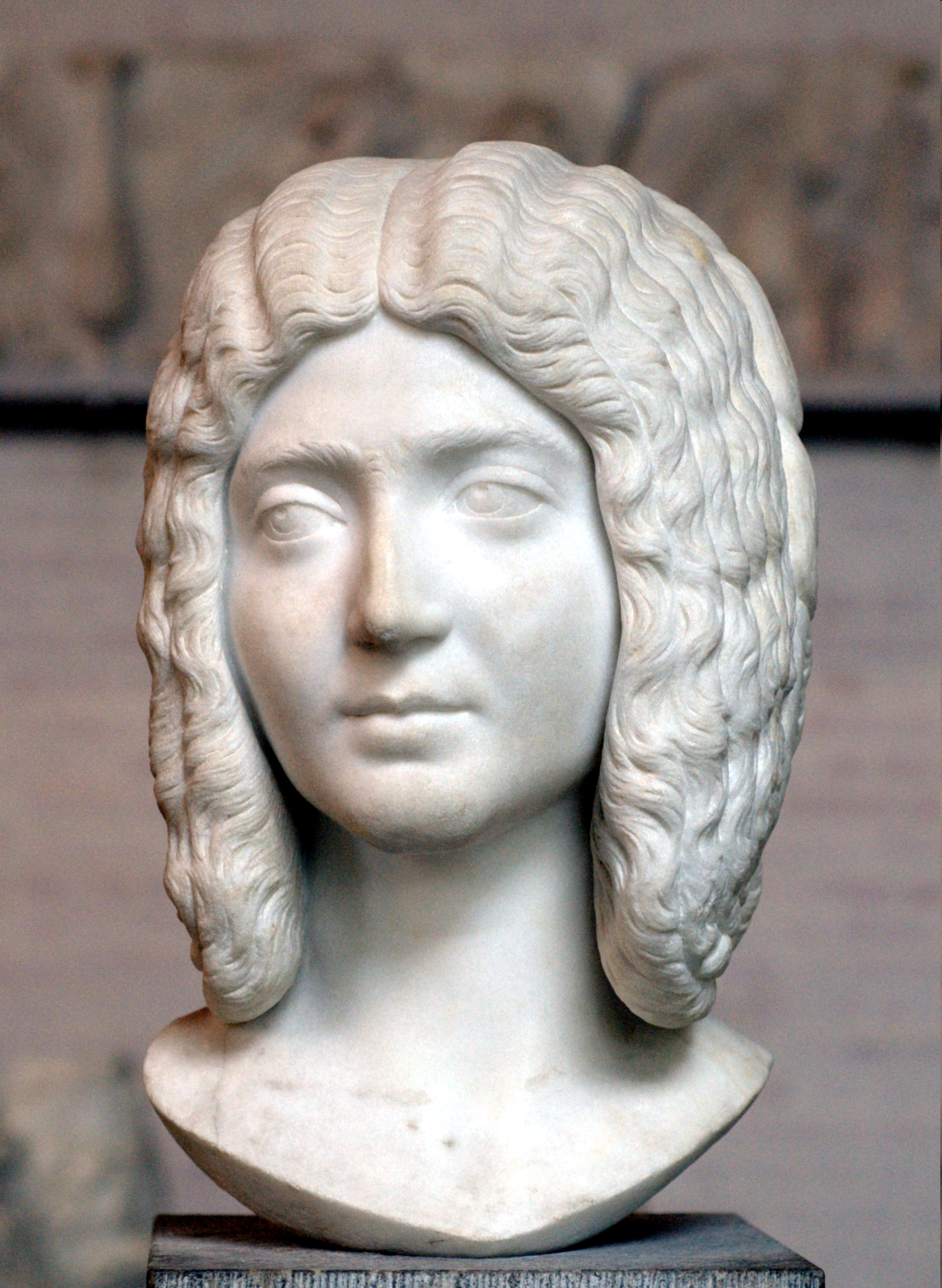|
218
Year 218 ( CCXVIII) was a common year starting on Thursday of the Julian calendar. At the time, it was known as the Year of the Consulship of Severus and Adventus (or, less frequently, year 971 ''Ab urbe condita''). The denomination 218 for this year has been used since the early medieval period, when the Anno Domini calendar era became the prevalent method in Europe for naming years. Events By place Roman Empire * May 16 – Julia Maesa, an aunt of the assassinated Emperor Caracalla, is banished to her home in Syria by the self-proclaimed emperor Macrinus, and declares her grandson Elagabalus, age 14, emperor of Rome. * June 8 – Battle of Antioch: Elagabalus defeats, with the support of the Syrian legions, the forces of Macrinus. Macrinus flees, but is captured near Chalcedon and later executed in Cappadocia. * Diadumenianus, son of Macrinus, escapes to the Parthian court, but is captured at Zeugma and also put to death. Asia * Spring – Ji Be ... [...More Info...] [...Related Items...] OR: [Wikipedia] [Google] [Baidu] |
Elagabalus
Marcus Aurelius Antoninus (born Sextus Varius Avitus Bassianus, 204 – 13 March 222), better known by his posthumous nicknames Elagabalus ( ) and Heliogabalus ( ), was Roman emperor from 218 to 222, while he was still a teenager. His short reign was notorious for religious controversy and alleged sexual debauchery. A close relative to the Severan dynasty, he came from a prominent Syrian Arabs, Syrian Arab family in Emesa (Homs), Roman Syria, Syria, where he served as the head priest of the Solar deity, sun god Elagabalus (deity), Elagabal from a young age. After the death of his cousin, the emperor Caracalla, Elagabalus was raised to the principate at 14 years of age in an army revolt instigated by his grandmother Julia Maesa against Caracalla's short-lived successor, Macrinus. He only posthumously became known by the Latinised name of his god. Elagabalus is largely known from accounts by the contemporary senator Cassius Dio who was strongly hostile to him, Herodian, who lik ... [...More Info...] [...Related Items...] OR: [Wikipedia] [Google] [Baidu] |
Diadumenian
Diadumenian ( ; ; 14September 208 – June 218) was the son of the Roman emperor Macrinus and served as his co-ruler for a brief time in 218. His mother, Macrinus' wife, is called Nonia Celsa in the unreliable , though this name may have been fictional. Diadumenian became in May 217, shortly after his father's accession to the imperial throne. Elagabalus, a relative of the recently deceased Caracalla, revolted in May of the following year, and Diadumenian was elevated to co-emperor. After Macrinus was defeated in the Battle of Antioch on 8 June 218, Diadumenian was sent to the court of Artabanus IV of Parthia to ensure his safety; however, he was captured and executed along the way. After his death and that of his father, the Senate declared both of them enemies of Rome and had their names struck from records and their images destroyed — a process known in modern scholarship as . History Diadumenian was born on 14 September 208, named Marcus Opellius Diadumenianus, to ... [...More Info...] [...Related Items...] OR: [Wikipedia] [Google] [Baidu] |
Macrinus
Marcus Opellius Macrinus (; – June 218) was a Roman emperor who reigned from April 217 to June 218, jointly with his young son Diadumenianus. Born in Caesarea (now called Cherchell, in modern Algeria), in the Roman province of Mauretania Caesariensis to an equestrian family of Berber origins, he became the first emperor who did not hail from the senatorial class and also the first emperor who never visited Rome during his reign. Before becoming emperor, Macrinus served under Emperor Caracalla as a praetorian prefect and dealt with Rome's civil affairs. He later conspired against Caracalla and had him murdered in a bid to protect his own life and succeeded Caracalla as emperor. Macrinus was proclaimed emperor of Rome by 11 April 217 while in the eastern provinces of the empire and was subsequently confirmed as such by the Senate; however, for the duration of his reign, he never had the opportunity to return to Rome. His predecessor's policies had left Rome's coffers empty ... [...More Info...] [...Related Items...] OR: [Wikipedia] [Google] [Baidu] |
Battle Of Antioch (218)
The Battle of Antioch (8 June 218) was fought between the Roman army of the Emperor Macrinus and his rival Elagabalus, whose troops were commanded by General Gannys, probably a short distance from Antioch. Gannys' victory over Macrinus led to the downfall of the emperor and his replacement by Elagabalus. Macrinus' predecessor, Caracalla, was murdered by a disaffected soldier during a campaign against Parthia on 8 April 217. Macrinus himself may have had a hand in the murder of Caracalla. Within days of Caracalla's death, Macrinus was proclaimed emperor with the support of the army. At the time of his accession he inherited all of the problems that Caracalla had left for Rome—war against Parthia, threats from Armenia and Dacia, and extensive fiscal expenditures. Macrinus successfully concluded a peace with Parthia, but it came at considerable cost to Rome. Finally, his policies to reduce monetary expenditures only stoked discontent within the military. Caracalla's aunt, Julia M ... [...More Info...] [...Related Items...] OR: [Wikipedia] [Google] [Baidu] |
Syria
Syria, officially the Syrian Arab Republic, is a country in West Asia located in the Eastern Mediterranean and the Levant. It borders the Mediterranean Sea to the west, Turkey to Syria–Turkey border, the north, Iraq to Iraq–Syria border, the east and southeast, Jordan to Jordan–Syria border, the south, and Israel and Lebanon to Lebanon–Syria border, the southwest. It is a republic under Syrian transitional government, a transitional government and comprises Governorates of Syria, 14 governorates. Damascus is the capital and largest city. With a population of 25 million across an area of , it is the List of countries and dependencies by population, 57th-most populous and List of countries and dependencies by area, 87th-largest country. The name "Syria" historically referred to a Syria (region), wider region. The modern state encompasses the sites of several ancient kingdoms and empires, including the Eblan civilization. Damascus was the seat of the Umayyad Caliphate and ... [...More Info...] [...Related Items...] OR: [Wikipedia] [Google] [Baidu] |
Roman Numerals
Roman numerals are a numeral system that originated in ancient Rome and remained the usual way of writing numbers throughout Europe well into the Late Middle Ages. Numbers are written with combinations of letters from the Latin alphabet, each with a fixed integer value. The modern style uses only these seven: The use of Roman numerals continued long after the Fall of the Western Roman Empire, decline of the Roman Empire. From the 14th century on, Roman numerals began to be replaced by Arabic numerals; however, this process was gradual, and the use of Roman numerals persisted in various places, including on clock face, clock faces. For instance, on the clock of Big Ben (designed in 1852), the hours from 1 to 12 are written as: The notations and can be read as "one less than five" (4) and "one less than ten" (9), although there is a tradition favouring the representation of "4" as "" on Roman numeral clocks. Other common uses include year numbers on monuments and buildin ... [...More Info...] [...Related Items...] OR: [Wikipedia] [Google] [Baidu] |
Ji Ben
Ji Ben (died 218) was an imperial physician who lived during the late Eastern Han dynasty of China. In 218, he started a rebellion with several others in the imperial capital, Xu (許; present-day Xuchang, Henan), but the revolt was suppressed and the conspirators were captured and executed. Error in name Ji Ben's given name was actually "Pi" (). His name is believed to have been erroneously recorded as "Ben" () in historical texts to avoid naming taboo, because "Pi" was the personal name of Cao Pi, the first ruler of the Cao Wei state. Besides, the Chinese character for "Pi" might have actually been 㔻 instead of 丕. There were instances where 㔻 had been mistakenly written as 丕. Life Ji Ben served as a court physician (太醫令) in the imperial court of the Eastern Han dynasty during the reign of Emperor Xian (). Around the time, the Han central government had fallen under the control of Cao Cao, the Imperial Chancellor. Emperor Xian was merely a figurehead ruler. In 216 ... [...More Info...] [...Related Items...] OR: [Wikipedia] [Google] [Baidu] |
Cao Zizheng
Cao Zizheng (died 218) was a son of Cao Cao, a warlord who rose to power in the late Eastern Han dynasty and laid the foundation for the state of Cao Wei in the Three Kingdoms period of China. His mother was Lady Li (李姬), a concubine of Cao Cao. She also bore Cao Cao two other sons: Cao Zicheng and Cao Zijing. As his uncle Cao Shao (曹紹) had no heir, Cao Zizheng was adopted as Cao Shao's son. In 217, he was enfeoffed as the Marquis of Mei (郿侯). He died in the following year without a son to succeed him. In 220, Cao Zizheng's half-brother Cao Pi became the first emperor of the Cao Wei state after usurping the throne from Emperor Xian, the last emperor of the Han dynasty. The following year, he honoured Cao Zizheng with the posthumous title "Duke Dai of Mei" (郿戴公), and ordered Cao Fan (曹範), a son of Cao Ju, to be Cao Zizheng's heir. In 222, Cao Pi enfeoffed Cao Fan as the Marquis of Pingshi (平氏侯), but changed his title to Marquis of Chengwu (成武侯) ... [...More Info...] [...Related Items...] OR: [Wikipedia] [Google] [Baidu] |
Yu Si
Yu Si (218 - May 271), courtesy name Shihong, was a Chinese military general and politician of the state of Eastern Wu during the Three Kingdoms period of China. Life Yu Si was the fourth son of Yu Fan, an official who served under Sun Quan, the founding emperor of Eastern Wu, and under Sun Quan's predecessor, Sun Ce. His ancestral home was in Yuyao County (餘姚縣), Kuaiji Commandery, which is in present-day Yuyao, Zhejiang. However, he was born in Nanhai Commandery (南海郡; around present-day Guangzhou, Guangdong) in Jiao Province because his father was exiled there by Sun Quan for showing disrespect on several occasions. Yu Si was 15 years old when his father died. After Yu Fan's death, Sun Quan freed his family from exile and allowed them to return to Yuyao County and bring Yu's remains back there for burial. In 258, the Wu regent Sun Chen deposed the emperor Sun Liang and replaced him with Sun Xiu, the Prince of Langya (琅邪王). Before Sun Xiu arrived at the pala ... [...More Info...] [...Related Items...] OR: [Wikipedia] [Google] [Baidu] |
Gu Shao in the Three Kingdoms period.
The Gu clan, which he was from, was one of the four most influential clans in Wu Commandery and also in the Jiangdong region at the time.
Gu Shao ( 188–218), courtesy name Xiaoze, was an official serving under the warlord Sun Quan in the late Eastern Han dynasty of China. Family background Gu Shao's ancestral home was in Wu County, Wu Commandery, which is present-day Suzhou, Jiangsu. He was the eldest son of Gu Yong, who later became the second Imperial Chancellor of the state of Eastern Wu Wu (Chinese language, Chinese: 吳; pinyin: ''Wú''; Middle Chinese *''ŋuo'' < Eastern Han Chinese: ''*ŋuɑ''), known in historiography as Eastern Wu or Sun Wu, was a Dynasties of China, dynastic state of China and one of the three major sta ...
|
Julia Maesa
Julia Maesa (7 May before 160 AD – AD) was a member of the Severan dynasty of the Roman Empire who was the grandmother of emperors Elagabalus and Severus Alexander, elder sister of empress Julia Domna, and mother of Julia Soaemias and Julia Mamaea. She wielded influence during the reigns of her grandsons as List of Augustae, Augusta of the Empire from 218 to her death, especially on their elevation to emperors. Born in Homs, Emesa, Roman Syria, Syria (modern day Homs), to an Arab family of priests of the deity Elagabalus (deity), Elagabalus, Maesa and her sister Domna were the daughters of Julius Bassianus. Through her sister's marriage, Maesa became sister-in-law to Septimius Severus and aunt of Caracalla and Geta (emperor), Geta, who all became emperors. She married fellow Syrian Julius Avitus, who was of consular rank. They had two daughters, Soaemias and Mamaea, who became mothers of Elagabalus and Severus Alexander, respectively. As one of the Severan dynasty's prominen ... [...More Info...] [...Related Items...] OR: [Wikipedia] [Google] [Baidu] |
Anno Domini
The terms (AD) and before Christ (BC) are used when designating years in the Gregorian calendar, Gregorian and Julian calendar, Julian calendars. The term is Medieval Latin and means "in the year of the Lord" but is often presented using "our Lord" instead of "the Lord", taken from the full original phrase "", which translates to "in the year of our Lord Jesus Christ". The form "BC" is specific to English language, English, and equivalent abbreviations are used in other languages: the Latin (language), Latin form, rarely used in English, is (ACN) or (AC). This calendar era takes as its epoch (date reference), epoch the traditionally reckoned year of the annunciation, conception or Nativity of Jesus, birth of Jesus. Years ''AD'' are counted forward since that epoch and years ''BC'' are counted backward from the epoch. There is no year zero in this scheme; thus the year AD 1 immediately follows the year 1 BC. This dating system was devised in 525 by Dionysius Exiguus but was ... [...More Info...] [...Related Items...] OR: [Wikipedia] [Google] [Baidu] |





